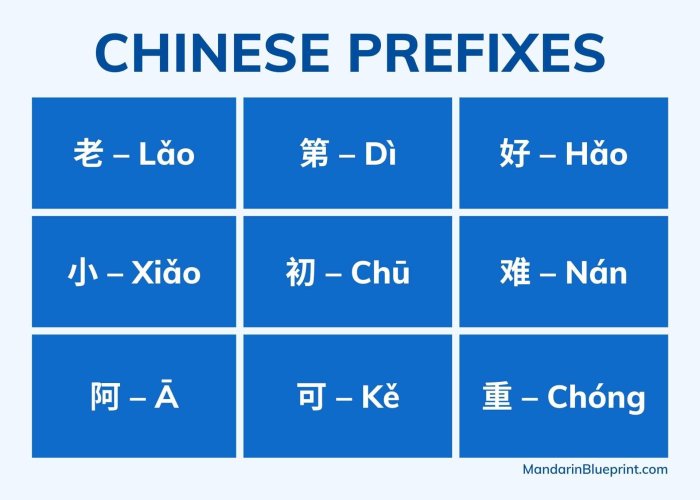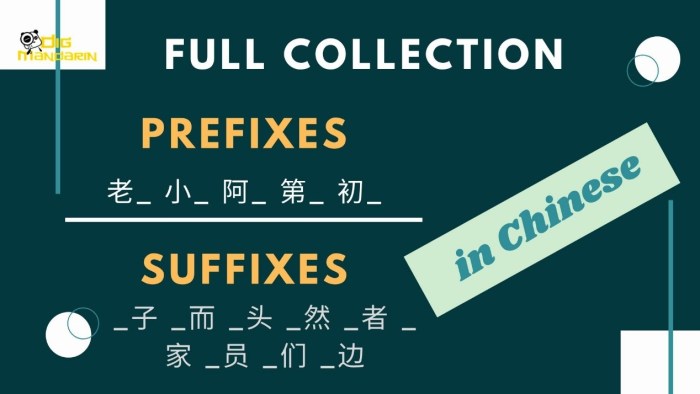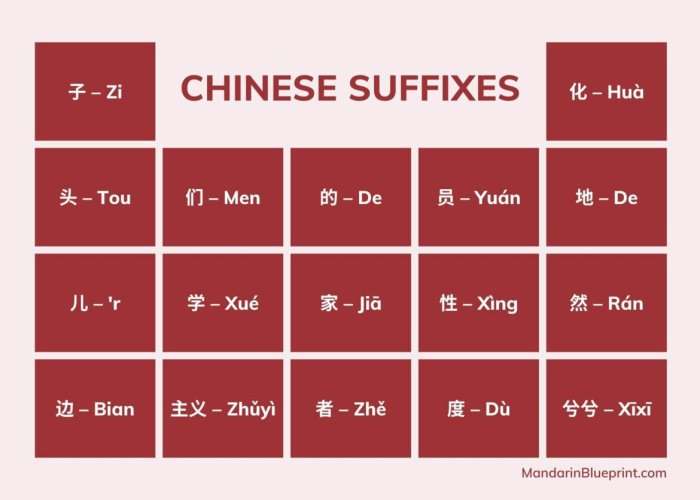Suffix with soft or china – Embark on a linguistic journey as we delve into the fascinating world of suffixes, particularly the enigmatic “soft” and “China” suffixes. These subtle yet impactful morphemes add layers of meaning and nuance to the Chinese language, inviting us to uncover their rich history, cultural significance, and communicative power.
From their origins in ancient dialects to their evolution across regional boundaries, we will trace the historical and cultural influences that have shaped the usage of these suffixes. We will also explore the intriguing variations in pronunciation and meaning across different dialects, highlighting the factors that contribute to these linguistic diversities.
Define and Categorize Soft and China Suffixes

Suffixes are letters or groups of letters added to the end of a word to form a new word or change the meaning of the original word. Soft and China suffixes are two broad categories of suffixes that are commonly used in English.
Soft suffixes typically have a consonant followed by a vowel, while China suffixes typically have a vowel followed by a consonant.
Soft Suffixes
Soft suffixes are typically used to form nouns, adjectives, or adverbs. Some common soft suffixes include:
- -ment(forms nouns denoting an action or state, e.g., excitement, government)
- -age(forms nouns denoting a state, quality, or action, e.g., courage, damage)
- -tion(forms nouns denoting an action or state, e.g., education, information)
- -ness(forms nouns denoting a quality or state, e.g., kindness, happiness)
- -ly(forms adverbs denoting manner or quality, e.g., quickly, easily)
China Suffixes
China suffixes are typically used to form nouns, adjectives, or verbs. Some common China suffixes include:
- -ic(forms adjectives denoting a quality or characteristic, e.g., heroic, poetic)
- -ive(forms adjectives denoting a quality or tendency, e.g., active, creative)
- -ize(forms verbs denoting an action or process, e.g., realize, organize)
- -fy(forms verbs denoting an action or process, e.g., amplify, clarify)
- -ment(forms nouns denoting a state or condition, e.g., excitement, government)
Illustrate Examples of Soft and China Suffixes

To further understand soft and China suffixes, let’s delve into some specific examples.
Table of Soft and China Suffixes
The following table provides a comprehensive list of common soft and China suffixes, along with their pronunciations and meanings:
| Suffix | Pronunciation | Meaning |
|---|---|---|
| -able | /əbəl/ | Capable of being |
| -ible | /əbəl/ | Capable of being |
| -ment | /mənt/ | Result or state of being |
| -tion | /ʃən/ | Action or state of being |
| -ity | /ɪti/ | Quality or state of being |
| -china | /tʃaɪnə/ | A fine, white porcelain |
| -ware | /wɛər/ | Goods made from a particular material |
Additional Examples
Here are some additional examples of soft and China suffixes in use:
- Soft suffixes:lovable, possible, enjoyment, information, beauty
- China suffixes:porcelain, earthenware, stoneware
Discuss Historical and Cultural Influences on Suffix Usage

The usage of soft and China suffixes has undergone significant evolution throughout history, influenced by various cultural factors. These suffixes reflect societal norms and values, providing insights into the development of language and its connection to the culture.
Historical Evolution of Soft and China Suffixes
In ancient Chinese, the use of soft and China suffixes was primarily determined by the social status of the speaker and the person being addressed. Soft suffixes, such as “-zi” and “-er,” were used to denote respect and deference towards superiors, while China suffixes, such as “-tou” and “-zai,” were used to express familiarity and intimacy among equals or inferiors.
Over time, the usage of these suffixes became more nuanced, reflecting changes in social norms and cultural values. During the Tang Dynasty (618-907), the use of soft suffixes became more widespread, as society emphasized politeness and respect. In contrast, during the Ming Dynasty (1368-1644), the use of China suffixes gained prominence, reflecting a more egalitarian and informal society.
Cultural Factors Influencing Suffix Usage
The usage of soft and China suffixes is also influenced by cultural factors such as regional variations, gender roles, and the context of the conversation. In southern China, soft suffixes are more commonly used than in northern China, reflecting regional differences in communication styles.
Gender roles also play a role in suffix usage. Traditionally, women were expected to use soft suffixes more frequently than men, as it was considered more polite and feminine. In modern society, however, gender roles are becoming less rigid, and the usage of suffixes is more fluid.
Suffixes Reflecting Societal Norms and Values
The usage of soft and China suffixes provides insights into societal norms and values. Soft suffixes convey respect, politeness, and deference, while China suffixes express familiarity, intimacy, and informality. The choice of suffix in a given situation reflects the speaker’s understanding of social conventions and their relationship to the person being addressed.
By understanding the historical and cultural influences on suffix usage, we can gain a deeper appreciation for the nuances of Chinese language and its connection to the culture.
Explore Variations in Usage Across Different Dialects

Regional dialects in China exhibit distinct variations in the usage of soft and China suffixes. These variations extend to pronunciation, meaning, and even grammatical functions.
Pronunciation Variations, Suffix with soft or china
The most noticeable variation is in pronunciation. For example, in Standard Mandarin, the soft suffix
When it comes to suffixes, there are a few different ways to soften the sound. One way is to use a suffix that ends with a soft consonant, like “-ish” or “-age.” Another way is to use a suffix that begins with a vowel, like “-ity” or “-ance.”
For more information on this topic, check out this csun bus 302 lab review . Additionally, you can also use a suffix that has a schwa sound, like “-er” or “-ment.”
- zi is pronounced as [t͡sɨ], while in some southern dialects like Cantonese, it is pronounced as [tsi]. Similarly, the China suffix
- er is pronounced as [ɚ] in Mandarin, but as [ɐ] in Cantonese.
Meaning Variations
In addition to pronunciation, the meaning of suffixes can also vary across dialects. For instance, the soft suffix
zi in Mandarin typically indicates a diminutive or affectionate tone, while in Cantonese, it can also convey a sense of intimacy or familiarity.
Grammatical Variations
Furthermore, the grammatical functions of suffixes can differ in different dialects. In Mandarin, the China suffixer is commonly used to form comparative adjectives, as in “更大” (da4ge4, bigger). However, in some dialects like Shanghainese, it can also be used to form nouns, such as “老虎” (lao3hu3, tiger).
Contributing Factors
The variations in suffix usage across dialects are influenced by a combination of historical, geographical, and cultural factors. Regional isolation, cultural exchange, and the influence of minority languages have all played a role in shaping the distinct linguistic features of different dialects.
Analyze the Impact on Communication and Understanding

The use of soft and China suffixes can significantly impact communication and understanding, both within and across different language barriers.
Potential Misunderstandings
- Different interpretations of suffixes: The same suffix can have different meanings in different contexts, leading to misunderstandings.
- Cultural differences: The use of suffixes can vary across cultures, potentially causing confusion for speakers from different backgrounds.
Strategies for Effective Communication
- Contextual awareness: Paying attention to the context in which suffixes are used can help clarify their meaning.
- Cross-cultural understanding: Being aware of cultural differences in suffix usage can prevent misinterpretations.
- Explicit communication: When communicating across language barriers, it’s beneficial to explicitly state the intended meaning of suffixes.
Helpful Answers: Suffix With Soft Or China
What is the difference between soft and China suffixes?
Soft suffixes are used to indicate endearment, intimacy, or politeness, while China suffixes are used to convey a sense of authority, respect, or distance.
How do I use soft and China suffixes correctly?
The usage of soft and China suffixes varies depending on the context and the relationship between the speaker and the listener. Generally, soft suffixes are used in informal settings, while China suffixes are used in more formal settings.
